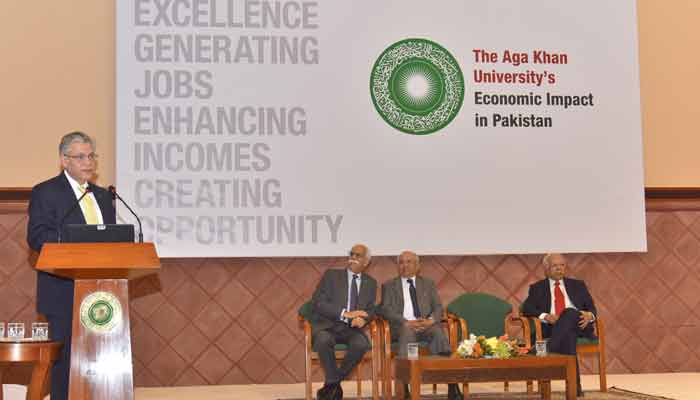Study finds AKU supports 33,000 jobs annually in Sindh
The study also noted that AKU’s spending has a multiplier effect, with every rupee of its direct gross value added generating Rs 7.3 in economic benefits.
KARACHI: The Aga Khan University launched Thursday a landmark study which found that the university has an annual economic impact in Pakistan of Rs 103 billion, or US$ 1 billion, and supports 42,000 jobs, including 33,000 in Sindh.
The study also noted that AKU’s spending has a multiplier effect, with every rupee of its direct gross value added generating Rs 7.3 in economic benefits.
“This report makes clear the remarkable extent of the Aga Khan University’s economic impact,” said Chief Minister of Sindh Syed Murad Ali Shah. “It also tells the story of an institution whose dedication to world-class quality and innovation is matched by its determination to improve the lives of the poor in Sindh and across Pakistan.”
The study is the work of a team of economists from Centennial Group International, a US-based consulting firm, many of them former senior officials at the World Bank. It is the first-ever study of AKU’s economic impact, and is believed to be the first comprehensive economic impact study of a Pakistani university.
AKU generates its economic impact in various ways as mentioned in the report: by providing high-quality education, thereby increasing the earning power of its alumni; by offering outstanding health care, thereby keeping people healthy and productive; and as a major purchaser of goods and services, thereby generating revenues for businesses and jobs for people.
The authors call the University “a national innovator and a powerhouse for quality,” and “a nationwide role model for high-quality tertiary education and medical care.”
“The university occupies a special place in the country. The AKU brings a culture of high quality. It is a cradle of innovation which strengthens our capacity to achieve our goals as individuals and as a society,” Health Minister Dr Sikandar Mandhro said.
“AKU President and CEO Firoz Rasul said, “In Sindh, we have two campuses, as well as five hospitals and 128 outreach medical centres that treat 1.3 million people annually. We conduct health research that focuses on diseases of poverty at a dozen sites across the province. Plus, more than 100 middle and secondary schools in Sindh are affiliated with the AKU Examination Board.”
Over five years, the university will be working with government health providers to improve health for 3.6 million women and children in Sindh as part of its Umeed-e-Nau (New Hope) project, funded by the Bill & Melinda Gates Foundation. The project also will be active in Punjab and Balochistan, reaching a total of 11.5 million beneficiaries.
Dr Ishrat Husain served as an adviser to the report’s authors. “The study is an admirably rigorous analysis of the difference that AKU has made in Pakistan,” said Dr Husain, former Governor of the State Bank of Pakistan, former AKU Trustee and former Dean and Director of the Institute of Business Administration.
In addition to analysing AKU’s economic impact, Centennial’s report also highlighted the public benefits the university created for society, stating they are likely the most important contribution of AKU to Pakistan.
Seven of Pakistan’s top 10 health researchers are AKU faculty, according to the Pakistan Council for Science and Technology, and the University’s health research is helping to save the lives of women and children living in poverty.
-
NHS warning to staff on ‘discouraging first cousin marriage’: Is it medically justified?
-
Ariana Grande opens up about ‘dark’ PTSD experience
-
Dakota Johnson reveals smoking habits, the leading cause of lung cancer
-
Chris, Liam Hemsworth support their father post Alzheimer’s diagnosis
-
Tom Hanks diabetes 2 management strategy laid bare
-
Catherine O’Hara becomes beacon of hope for rectal cancer patients
-
FDA sends 'refusal-to-file' to Moderna over new flu vaccine
-
Cure flu with theses two golden foods












